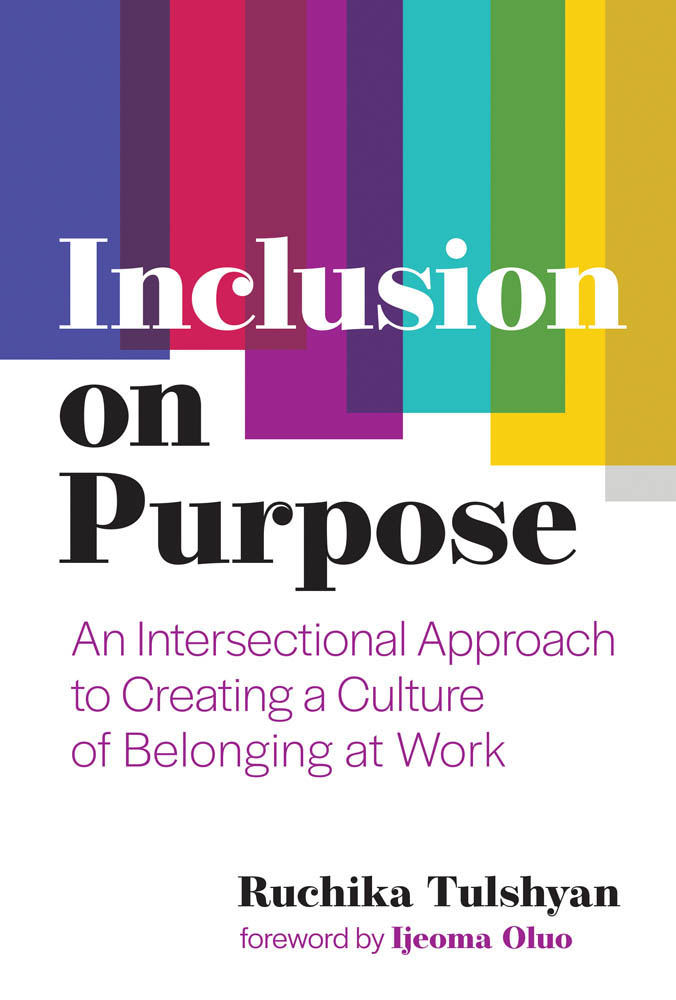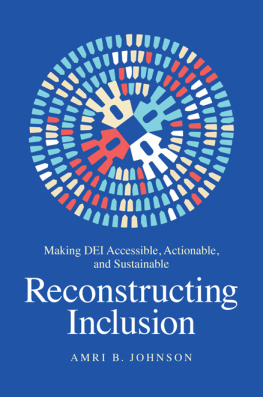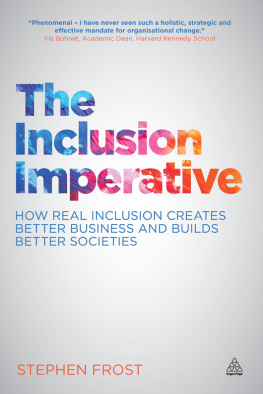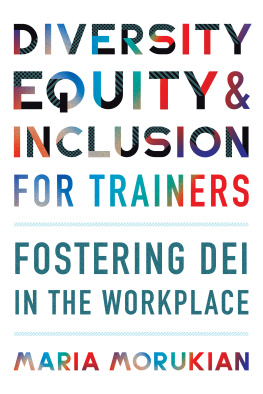Contents
Guide
Pagebreaks of the print version

Inclusion on Purpose
An Intersectional Approach to Creating a Culture of Belonging at Work
Ruchika Tulshyan
Foreword by Ijeoma Oluo
The MIT Press
Cambridge, Massachusetts|London, England
2022 Ruchika Tulshyan
All rights reserved. No part of this book may be reproduced in any form by any electronic or mechanical means (including photocopying, recording, or information storage and retrieval) without permission in writing from the publisher.
The MIT Press would like to thank the anonymous peer reviewers who provided comments on drafts of this book. The generous work of academic experts is essential for establishing the authority and quality of our publications. We acknowledge with gratitude the contributions of these otherwise uncredited readers.
Library of Congress Cataloging-in-Publication Data
Names: Tulshyan, Ruchika, author.
Title: Inclusion on purpose : an intersectional approach to creating a culture of belonging at work / Ruchika Tulshyan ; foreword by Ijeoma Oluo.
Description: Cambridge, Massachusetts : The MIT Press, 2022. | Includes bibliographical references and index. | Summary: A guide for organizations to improve their diversity, equity, and inclusion efforts, focusing specifically on the experiences of women of colorProvided by publisher.
Identifiers: LCCN 2021015858 | ISBN 9780262046558 (hardcover)
Subjects: LCSH: Diversity in the workplaceCase studies. | Minority womenEmployment. | Womens rights.
Classification: LCC HF5549.5.M5 T85 2022 | DDC 658.3008dc23
LC record available at https://lccn.loc.gov/2021015858
d_r0
To women of color everywhere, especially S and R. I am, because you are.
To all our champions in the journey, especially P, S, and V.
Om tat sat.
Contents
Foreword
Ijeoma Oluo
I will always remember the advice my mom gave me before starting my first real job as a young adult. She offered up a bunch of the expected basics: always be five minutes early, make friends by being helpful, dont gossip. I rolled my eyes through a lot of it as many young people do when their parents are trying to share their wisdom with them. My eyes glazed over as I, big on attitude in my early twenties, had already decided that having a successful career would be as easy for me as being successful in school had been.
And most important, my mother concluded, voice raising to bring back my attention, no matter what happens, NEVER go to HR.
Waitwhat?
Did I hear that right? Was my mom telling me to not bring work issues to the people you are supposed to bring work issues to?
She explained that her experience of her years in the workforce and the experiences of her peers had made it clear that even if sexual harassment in the workplace was bad, even if racism from your coworkers or boss was bad, none of it was as bad as getting labeled a troublemaker by going to HR. Bringing your grievances to HR not only did little to end the harassment that the complainant was facing, it also would kill any chances of advancement.
HR doesnt work for you, my mom said, They work for the company. They arent paid to make sure that there arent any problems for you; they are paid to make sure there arent any problems for the CEO. When you complain, you become a problem.
As I sat through the company initiation training over the next few days I became convinced that my mom was being overdramatic or her advice was out of date and out of sync with modern workplaces. Friendly Human Resources professionals clicked play on VHS players that showed films on how to avoid being a sexual harasser, how to not make racist jokes. The HR manager handed out thick packets that outlined the companys anti-harassment policies. We all had to sign them.
Surely, this was a place where any issues of racism or sexism would be swiftly dealt with.
I was assigned to my first work team in data entry. I sat in my very first cubicle, right outside my managers office. I was eager to prove my worth, taking on extra tasks and trying to perform my work as quickly and accurately as possible. I tried to show that I had a good personality by occasionally telling my boss a funny little anecdote or work-appropriate joke.
The first time I told my boss a funny story, she turned to one of my coworkers, an older white man who had been with the company for years and said, Isnt she just like Ebony?
He nodded and laughed lightly in recognition.
Ebony must have been funny.
Then my boss walked by my cubicle one day while I was eating my lunch.
Just like Ebony, she commented. My coworker chuckled again.
Another day I was asking her a question about an account I was working on and she interrupted me halfway through to say to my coworker, Man, isnt she just like Ebony?
It took me a while to realize that Ebony was just Black.
But, my boss had liked Ebony, so she liked me, too. I quickly became a favorite. I was given chances to show my potential in extra work projects that were offered my way. I was invited to take lunch in her office and catch her up on all the team gossip.
One day we were eating lunch and a woman from one of the neighboring teams walked by. She was a Black woman who had been at the company for a few months longer than I. There were very few Black people at the company, so we all had made it a point to know each other. I really liked her. She was a hard worker and always willing to help answer any questions I had. She had a great sense of humor. But as she walked by the office she looked positively miserable.
My boss looked at her and shook her head. I cant believe she did that, she said, her voice full of disappointment and a tinge of betrayal.
What did she DO?, I asked, expecting some scandalous gossip.
She went to HR, my boss explained. I know things were bad for her on her team, but she could have found another way. Its over for her now. Shes never going to get a promotion; shes never going to get another special project. She might as well quit. Shes on the shit list.
The shit list wasnt metaphorical. It was an actual list that our division manager, a white woman, kept in a notebook on her desk. It was literally titled shit list, and on it she kept a list of names of people who had wronged her and she had vowed to make miserable. Occasionally, when she felt that people werent fearing her enough to give her the respect she felt she deserved, she would show the list to enough people to get everyone talking about it again. You could get on the shit list for making her look bad in a meeting by being unprepared, or by being too prepared and making her look unprepared, or for buddying up with her work enemy (the other division manager). Going to HR, even with problems of racist harassment, would make her look bad once word reached her superiorsand would land you on the shit list for life.
There were many Black women on the shit list.
Over the years I learned that my ability to earn the money I needed to feed my family meant that I was going to have to ignore everyday racist and sexist insults, large and small. I have been the brunt of racist jokes. Ive had managers reach over and touch my hair in the middle of office meetings. Ive been groped and kissed in work elevators by men I hardly knew and gave no consent to. Ive been talked down to and passed over.
And I did not go to HR once.
Why? Because I saw that, just as I witnessed in my first job, my mother was right. Time and time again, women and people of color who dared ask for a work environment free from harassment or discrimination were punished. Not all were actually added to a shit list but they might as well have been. Nobody seemed to pay for the audacity of expecting to be treated with respect as much as Black women were.










